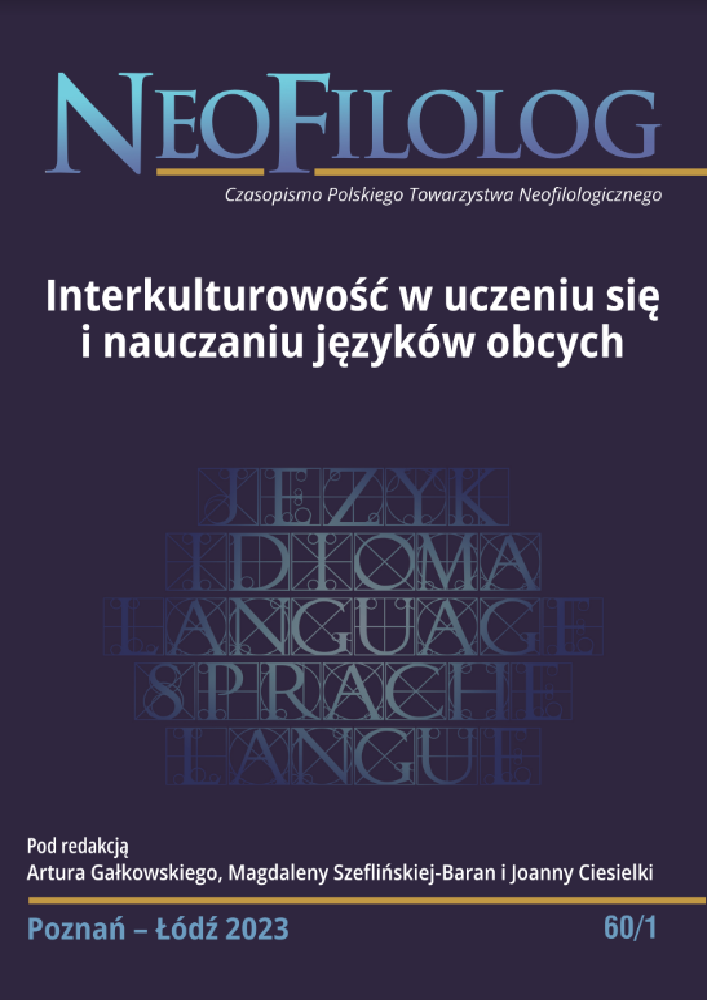Abstract
Language teaching offers two main modes of managing otherness in the classroom. The first, the intercultural approach, inherited from the communicative approach, focuses on the intercultural encounter. The second, the co-cultural perspective, based on the development of a common culture negotiated between representatives of different cultures, corresponds to the mode of managing in the action-oriented approach of foreign language teaching. This article questions the compatibility of these two approaches with the multilingual environment of foreign language teaching. It takes as a starting point the conception defended by Puren, who considers that there is conceptual break in the relationship to otherness between the intercultural approach and the co-cultural perspective. The article shows that the co-actional perspective is hardly compatible with the multilingual teaching context due to the absence of the real presence of otherness in class. Due to a lack of deep analysis in foreign language didactics of the treatment of culture in the multilingual teaching environment, the approach to culture remains based on simulation to prepare learner to the real encounter of otherness outside the classroom.
References
Abdallah Pretceille, M. (1999), L’éducation interculturelle. Paris : PUF.
Amossy R., Herschberg Pierrot A. (2015), Stéréotypes et clichés. Paris : Armand Colin.
Beacco J.-C. (2018), L’altérité en classe de langue. Pour une méthodologie éducative. Paris : Didier.
Bérard, É. (1991), L’approche communicative. Théorie et pratiques. Paris : Clé international.
Byram, M. (1992), Culture et éducation en langue étrangère. Paris : Didier.
Byram, M. (2013), Foreign language teaching and intercultural citizenship, (in :) Iranian Journal of Language Teaching Research, n°1, 53-62.
Conseil de l’Europe (2001), Cadre européen commun de référence pour les langues : apprendre, enseigner, évaluer. Strasbourg : Didier.
Holec, M. (1992), Apprendre à apprendre et apprentissage hétéro-dirigé, (in :) Le français dans le monde. Recherches et applications. Numéro spécial : les auto-apprentissages, 46-52.
Puren, C. (2009), Variations sur le thème de l’agir social en didactique des langues-cultures étrangères, (in :) Le Français dans le monde. Recherches et applications, n°45, 154-167.
Puren, C. (2011), Mises au point de/sur la perspective actionnelle, (in :) Association des professeurs de langues vivantes. Online : https://www.aplv-languesmodernes.org/spip.php?article3841 [consulté le 25.8.2022]
Puren, C. (2013), La compétence culturelle et ses composantes. Online : https://lewebpedagogique.com/alterite/files/2015/10/PUREN_2013c_Comp%C3%A9tence_culturelle_composantes.pdf [consulté le 25.8.2022]
Puren, C. (2020), Approche communicative-interculturelle et paradigme de l’immédiation (Niveaux Seuils à partir de 1975, CECR 2001, Volume complémentaire 2018). Online : https://www.christianpuren.com/mes-travaux/2020g/ [consulté le 2.9.2022]
Schmitt, F. (2017), La fonction de la culture source dans l’enseignement scolaire du français langue étrangère en Slovaquie, (in :) Synergies Europe, n°12, 13-22.
Schmitt, F. (2020), Le contexte culturel national de l’apprenant dans l’enseignement du FLE sur l’exemple de la méthode En français, (in :) Arcangeli M., Klimová K., Mesárová E., Reichwalderová E., Veselá D. (dir.) Lingue, letterature, identità in contatto. Rome : Aracne, 531-550.
Schmitt, F. (2021a), Quelles approches didactiques pour la composante socioculturelle du français langue étrangère ? (in :) Palimpsest. International Journal for Linguistic, Literacy and Cultural Research, vol. 6, n°11, 273-286.
Schmitt, F. (2021b), Le discours grammatical contextualisé dans les manuels de français publiés en Slovaquie et les manuels de FLE universalistes. Etude comparative des approches didactiques, (in :) Puchovská Z. (dir.) Le discours grammatical contextualisé slovaque dans la description du français (1918-2018), Paris : Éditions des archives contemporaines, 283-284. DOI: https://doi.org/10.17184/eac.4788
Windmüller, F. (2015), Apprendre une langue, c’est apprendre une culture. Leurre ou réalité ? L’apprentissage de la culture dans l’enseignement du français langue étrangère en milieu hétéroglotte. Giessener Eletronische Bibliothek.
Zarate, G. (1993), Représentations de l’étranger et didactique des langues. Paris : Didier.
License
Copyright (c) 2023 Francois Schmitt

This work is licensed under a Creative Commons Attribution-NoDerivatives 4.0 International License.
Authors
Authors of texts accepted for publication in Neofilolog are required to complete, sign and return to the Editorial team’s office the Agreement for granting a royalty-free license to works with a commitment to grant a CC sub-license.
Under the agreement, the authors of the texts published in Neofilolog grant Adam Mickiewicz University in Poznań a non-exclusive, royalty-free license and authorize the use of Attribution-NoDerivatives 4.0 International (CC BY-ND 4.0) Creative Commons sub-license.
The authors retain the right to the free disposal of the work.
Users
Interested Internet users are entitled to use works that have been published in Neofilolog since 2017, under the following conditions:
▪ attribution – obligation to provide, together with the distributed work, information about the authorship, title, source (link to the original work, DOI) and the license itself.
▪ no derivatives – the work must be preserved in its original form. Without the author's consent, it is not possible to distribute the modified work in the form of translations, publications, etc.
Copyrights are reserved for all texts published since 2017.
Miscellaneous
Adam Mickiewicz University in Poznań retains the property right as a whole (layout, graphic form, title, cover design, logo etc.).

